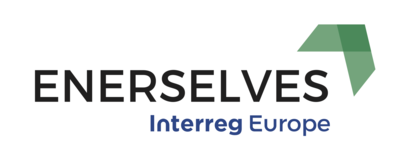Exchange of experiences
The relevance of cooperation: ENERSELVES has highlighted the need for new and better policies to promote the integration of renewable energy for self-consumption in buildings.
Results by Region
Extremadura, Spain:
- ROP ERDF Extremadura 2014-2020:
Improvements focused on RES: the promotion of the biomass sector for heating purposes, the promotion of other thermal RES integrated into buildings (solar thermal, PV, hybrid, geothermal), and the improvement of EE and RES in public buildings and the housing sector.
Also, 2 regional strategies have been addressed to lead the region to a low carbon economy in 2030: one focused on green and circular economy and one dedicated to the energy rehabilitation of public buildings.
The project has achieved important impacts both in the PUBLIC and the PRIVATE sectors: promoting RES integration in public & private buildings thanks to 2 calls launched in 2019 and 2020. And, jointly with the stakeholders, the Regional Bureau for Self-consumption, to promote the electric self-consumption in the region, has been created.
Blekinge, Sweden
ESS has developed and implemented a platform to enhance a cooperation network to promote new energy projects in buildings. The name of the project is "Cooperation for energy in the county of Blekinge - for sustainable and energy-efficient buildings" and it counts with the support of municipalities in the county, municipal housing companies, the region of Blekinge, the county administrative board of Blekinge and other cooperation partners like Blekinge Technical University. This has developed a significant increase in the number of photovoltaic installations in buildings during the implementation phase of ENESELVES project.
Świętokrzyskie, Poland
Developing the updated Development Strategy of the Świętokrzyskie Voivodeship dedicated to the solutions for limiting energy losses and the wider use of RES. Three key measures have been designed thanks to ENERSELVES project:
- Development of energy infrastructure, including improvement of heating, gas and electricity systems
- The use of RES in the economy, the public sphere and housing
- Increasing EE and energy management
Gozo, Malta
RESAP PLATFORM
- Promote new policies or improve existing ones to support the integration of RES in buildings for self-consumption.
- Design policies to promote RES for self-consumption technologies.
- Define clear KPIs (Key Performance Indicators) to identify the best investment by value.
- Transmit how European policies have an impact on society.
- Support the integration of RES in buildings
Lazio Region, Italy
- Provision of advisory services on RES.
- Support of public authorities, SMEs and citizens to develop targeted plans for the introduction of RES in buildings.
- Dedicated space for the networking between SMEs and public authorities.
- Training material in relation to RES, EE in buildings and FI for energy-related interventions. Lazio, Italy Energy efficiency interventions on two public buildings (Residential and not Residential).
- Guidance Actions to enhance the construction of NZEB in Lazio Region (the guidelines support the tasks of evaluation, plan and management of EE interventions).
North East Region, Romania
- Improving the public policy instrument ROP: Set of recommendations for modifying the evaluation grids included in the guidelines and submission to MA.
- Setting up Pilot One Stop Shops within the local public authorities: 2 pilot OSS in Miroslava Commune and Botosani City Hall.
- Pilot structured information platform for the support of RES implementation in buildings: 3 municipalities to replicate the platform on their websites (Miroslava Commune, Botoşani and Bacau Municipalities).
Autonomous Region of Sardinia, Italy
- Incentives for the realization of municipal electric microgrids: The promotion of energy storage systems in the Municipalities, in order to achieve at least 50% of instantaneous self-consumption of energy produced by RES plants already installed. Sardinia has incentivized energy storage systems, control and management systems which are aimed at maximizing the self-consumption in public buildings.
- Incentives for the promotion of decentralized energy production, energy storage systems and smart control and monitoring devices in the private sector, to encourage self-consumption for existing and/or new plants in buildings.
- The creation of a functional smart-grid for five regional buildings with PV System, storage devices, management and control system and integrated infrastructures for electric mobility.

